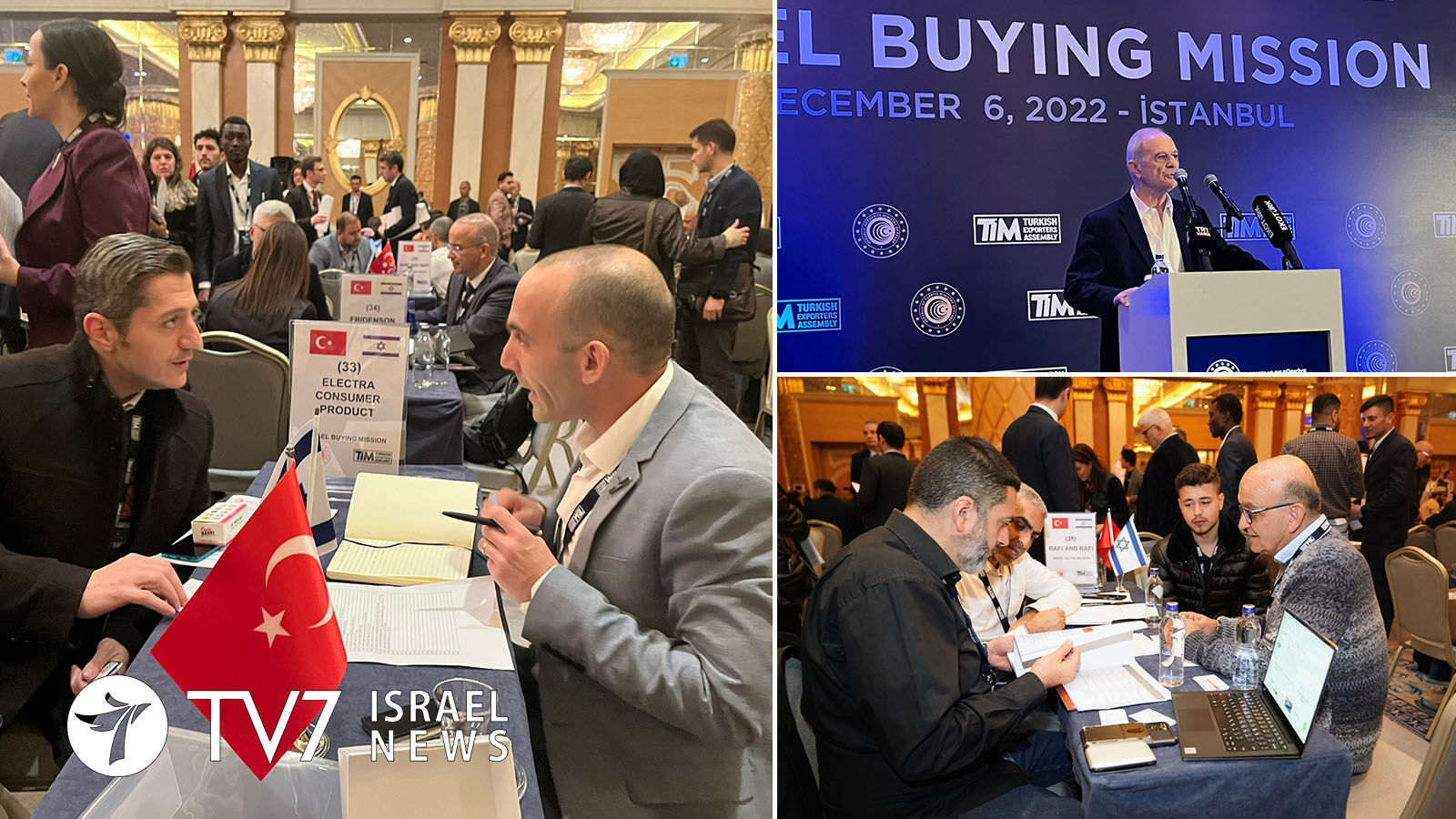The historic summit convenes to continue the momentum of enhancing bilateral economic relations.
By Erin Viner
A delegation from 60 import firms, members of the Federation of Israeli Chambers of Commerce (FICC), travelled to Istanbul to meet with representatives of 450 Turkish companies. Some of Israel’s largest retail chains including Supersol, Rami Levy, Yohannoff, Electra participated in the talks, which were organized by the Turkish Exporters Association (TIM).
Senior officials from the Israeli Ministries of Foreign Affairs and Economy, Israel’s Ambassador to Turkey Irit Lilian, Israel’s Economic Attaché to Turkey Matan Safran, Turkish Ministry of Economy Director General Mehmet Kilichalia and Turkish Exporters Assembly President Mustafa Gültepe were among diplomats and regional chambers of commerce heads who also attended the event.
Turkey is the fifth largest source of imports for Israel, followed only by China, the United States, Switzerland and Germany. 2.5% of the total goods imported to Israel come from Turkey, accounting for $8.4 billion last year. According to an Israeli government statement, the main types of imported goods are textiles, machinery, electrical and mechanical products, as well as building materials such as steel, iron, cement, rubber and plastic. Conversely, Turkey is the seventh largest recipient of Israeli goods, representing 2.3% of the total that Israel exports to the world.
“The significant increase of imports from Turkey, which has already reached $6.2 billion, in a wide variety of products, will reduce the cost of import to Israel. This is another way for us to contribute to combat the rising of the cost of living in Israel and to upgrade relations between the two countries. The warm welcome affirms the close bond between the two countries,” said FICC President Uriel Lynn, adding that “the positive balance of Israeli trade stands at about $21 billion and this will of course continue, thanks to meetings of the kind we are holding today.”
Emphasizing that this is the only the dawn of a new era in bilateral economic and diplomatic relations, Lynn predicted that within one to two years the volume of mutual trade with Turkey will reach $10 billion.
Ambassador Lilian hailed the summit for strengthening “the good faith” between Israel and Turkey.
“For a decade there has not been a meeting that comes close to this. Both sides are willing to take risks and the last few years have proven that the economic ties between Israel and Turkey can be spoiled. It is our duty to find further ways to enhance future collaborations that will serve the importers and exporters of both Turkey and Israel; benefiting the economies of both countries,” she said.
FICC Vice President Amir Shani remarked during a presentation that there had never been another delegation similar to this one.
“In the last four years there has been an 80% increase in trade between the countries and this is for three main reasons: quality of the products, the attractive prices and of course the transportation of the goods from a destination close to Israel,” he said, while pointing out that shipment from Turkey “has a great distance advantage over the USA, China and Europe.”
“The rapprochement between the two countries helps to balance the trade relations between the countries. This meeting is further proof that this is a historic event, creating another turning point for trade relations,” said Gültepe. While asserting that the Turkish Exporters Assembly and the FICC contribute much to the success of the ongoing trade between the countries, he affirmed intent to promote further trade in the various sections of the economy.
Israel and Turkey restored full diplomatic relations in August after more than a decade of tensions.
Onetime warm bilateral ties between the Jewish State and its strong Muslim ally were severely damaged by the 2010 Mavi Marmara incident in which 10 pro-Palestinian extremists from Turkey were killed when they violently attacked Israeli commandos trying to enforce the naval blockade of the Hamas-run Gaza Strip. Israel later paid Turkey $20 million in compensation as a key component of a deal signed in June 2016 to restore ties.
The row widened again when Turkish President Recep Tayyip Erdoğan condemned Israel as a “terrorist state” after 60 Palestinian rioters believed affiliated with the Islamist-Hamas terror group were killed in 2018 by the IDF during violent protests on the Gaza border against the opening of the United States Embassy in Jerusalem.
Israel has also long condemned Turkish support of the Islamist Hamas rulers of Gaza, including an office operated by the Palestinian terror group in Istanbul.
The breakthrough rapprochement between the two US allies followed “positive developments in Israel-Türkiye ties over the past year,” said a statement from the Israeli Prime Minister’s Office (PMO) in August; finalized in a congratulatory conversation Israeli Prime Minister Yair Lapid and Turkish President Erdoğan, as well as “understandings” Lapid reached during his visit to Ankara with Turkish Foreign Minister Mevlut Çavuşoğlu.”
“Upgrading relations will contribute to deepening ties between the two peoples, expanding economic, trade, and cultural ties, and strengthening regional stability,” said the PMO statement.
Israeli President Isaac Herzog also contributed to the de-escalation of hostilities during a diplomatic visit to Ankara in March, after which foreign ministers of both states conducted reciprocal visits. Welcoming the development, Herzog stressed, “Members of all faiths—Muslims, Jews, and Christians—can and must live together in peace.”
